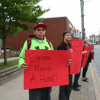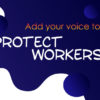Joining organizations such as the British Columbia Civil Liberties Association (BCCLA, whose March 17 statement is drawn from here), we are writing to express our deep concern about the current and ongoing well-being of our loved ones and communities, and the Nova Scotia government’s declaration of a State of Emergency (under subsection 12(1) of the Emergency Management Act) in relation to COVID-19. As a group of Nova Scotia community members, we are committed to expressing our thoughts to ensure our views are incorporated into our government’s agenda for the eradication of this serious health threat.
Like the BCCLA, we fully support the need for actions to be taken “by all levels of government that prioritize public health, including measures that resource our public infrastructure for the benefit of all and protect those, such as seniors, precarious workers, Indigenous communities, and homeless people, who are most vulnerable during this pandemic.” However, history demonstrates again and again that governments use moments of social crisis to expand power and violate vital constitutional principles, including those set forth in the Canadian Charter of Rights and Freedoms, in the name of “public safety.” When the declared emergency is over, the expanded powers often become permanent. Given this, we now call on the Nova Scotia and municipal governments, local police and RCMP, Nova Scotia Department of Justice, and the Halifax Board of Police Commissioners to exercise powers (and strictly monitor the exercise of such powers) in this State of Emergency in ways that respect the civil rights and freedoms of every single person and community in Nova Scotia. We are particularly concerned that current practices do not re-enact documented historical and ongoing patterns of state surveillance, policing, and prosecution that disproportionately target Black, Indigenous, and other racialized peoples, people living in poverty, and homeless, the mentally ill, and other vulnerable groups.
With the BCCLA, we point to the long and well-documented history of abuse of power under the federal War Measures Act (the predecessor to the federal Emergencies Act being weighed for declaration in Ottawa), which was invoked during World War I and II to detain, intern, and seize the property of Canadians defined as “enemy aliens,” with extreme consequences for Japanese Canadians. This abuse of power was also exercised during the 1970 October Crisis to effect thousands of searches and hundreds of detentions, the vast majority of which never led to formal charges. We remind Nova Scotia’s authorities that “Emergency” measures are “subject to the Canadian Charter of Rights and Freedoms.” We also underscore Michael MacDonald’s and Jennifer Taylor’s “Independent Legal Opinion on Street Checks” (October 2019) on their illegality, and the extensive documentation of the disproportionate impacts of policing on Black people and communities in our province. The Rao and Dixon African Nova Scotian families’ recent experiences with police conduct in the immediate wake of this ruling, official condemnations of police racist conduct, and the banning of street checks, have done nothing to assure our communities’ faith that racist policing has been meaningfully addressed. These recent examples provide timely reminders of the willful transgressions of state power as we move into this new State of Emergency in the province related to COVID-19.
Given how institutionalized racism and other intersecting socio-economic inequities shape policing and prosecution, as well as discrepancies in access to public and private resources and space, we are led to question who will be targeted in police enforcement and prosecution of anti-gathering and pro-social distancing measures in the current State of Emergency? How are the disproportionate and specific health concerns of Black, Indigenous, and other vulnerable communities and groups addressed in this public health crisis and this State of Emergency?
We call on communities and all official bodies in Nova Scotia to embrace this crisis as an opportunity to develop and implement practices that produce inclusive and equitable public health and safety practices, through what the BCCLA aptly calls “public infrastructure for the benefit of all,” and through holding each other and public authorities, responsible for our collective well-being. Examples of inclusive and equitable public health and safety practices include the following:
- Immediate translation of Emergency & related COVID-19 measures into Mi’kmaw and the languages of Nova Scotia’s refugee and immigrant communities to ensure crucial information is equally circulated;
- Clarity on penalties for non-payment of fines and measures to ensure impoverished people are not criminalized or have life- and public-health sustaining funds garnished. We definitively reject the fining of people living in poverty as a disproportionate penalty.
- Clear oversight and accountability measures for police: we demand a complaint mechanism be set up for the public to report abuses specific to the current application of the Emergency Management Act and the Health Protection Act, 2004.
- Clear rules around police entering property. Police must take a harm reduction approach to better ensure that vulnerable people will call for help when needed, particularly those in communities already alienated from the police.
- Immediate clarity is required from authorities regarding that ways that exercises of authority during the Emergency will not become street checks. We demand that community members be allowed to refuse to provide personal information, so as not to recreate the racist practice of street checks.
- Clear public communication on exactly what provincial and municipal authorities are doing to address the health of vulnerable communities (Black, Indigenous, and other racialized peoples, people living in poverty, the homeless and precariously housed, the mentally ill, the disabled) in the context of the COVID-19 pandemic.
- Clear measures to address the health of those still confined in the province’s “correctional” and “forensic” institutions for adults and youth, and long-term funding to support housing and health needs of people released from incarceration. Community members are concerned for all people confined in institutions, and note, for example, the over-representation of Black and Indigenous adults, and especially youth, in provincial detention. We also note that the vast majority of those in detention are on remand awaiting trial, and thus have never been convicted of a crime
Signed,
Concerned Community Members of Nova Scotia Working for Fully Inclusive Health and Safety in the Face of Covid-19, including
African Nova Scotian Decade for People of African Descent Coalition (DPAD Coalition)
Department of Social Justice & Community Studies, Saint Mary’s University (Benita Bunjun, Val Marie Johnson, El Jones, Darryl Leroux, Rachel Zellars)
Dr. Janet Conway, Nancy’s Chair in Women’s Studies, Mount Saint Vincent University
Dr. OmiSoore Dryden, James R. Johnston Chair in Black Canadian Studies, Faculty of Medicine, Dalhousie University
East Coast Prison Justice Society
Global Afrikan Congress-NS Chapter
Lynn Jones, activist
With a special thanks to our generous donors who make publication of the Nova Scotia Advocate possible.
Subscribe to the Nova Scotia Advocate weekly digest and never miss an article again. It’s free!



